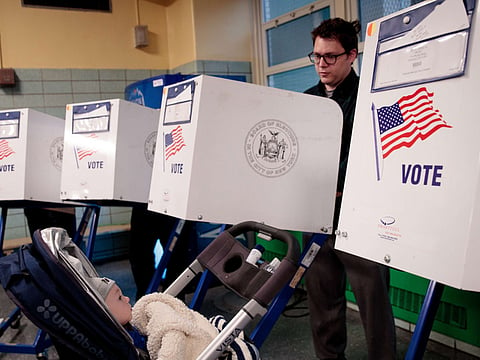Bracing for the day after
After all of the words spoken, miles travelled, money spent and 130 million votes cast, the way forward for America remains fundamentally dark

I can’t tell you who won the presidential election in the United States. This column will appear online while the voting is still going on, and in print around the time the winner becomes clear (assuming no systemic failure, too-close-to-call result or a tie in the Electoral College prolongs this already agonisingly long campaign).
However, it is already clear that American Democracy has lost. Also lost is any semblance of the idea that America’s democracy is somehow wiser or more mature. That it is better than others at containing raw emotion and blocking people’s worst impulses through its intricate 18th century system of checks and balances and its 20th century consensus regarding what constitutes political decorum. Perhaps more importantly, we may have lost the idea that political decorum is actually important. It is perfectly reasonable to want to shake up Washington and send the system a message, or to say that political correctness has sometimes got out of hand. But it is entirely something else to embrace the return of open bigotry as part of everyday political debate. It is one thing to roll one’s eyes at the elaborate niceties of traditional political speech, but that is a far cry from embracing a sneering contempt for opponents and casual calls for political violence.
It is fair to say that the Republicans have been the source of virtually all of the hateful rhetoric that has made its way into the political mainstream this year, but it is naive to think there are no Democrats eager to follow them down that path. Whatever the result of this election, the nature of American political discourse is clearly changing, and not for the better. If such a change is inevitable, what will that mean for Washington’s relationship with the wider world?
One of the clearest signals sent by the campaigning is that there is an activist base in both of America’s political parties, which is adamantly opposed to free trade and, at best, dubious about engagement with friends and foes alike. Ordinary Republicans and Democrats agree on little, but in surprisingly large numbers both subscribe to a few basic beliefs about foreign policy: That trade agreements almost always end up being bad deals for the US. That foreigners are always demanding that Americans fix things and then complaining when America tries to do as it was asked.
That American power ought to be respected, but usually isn’t. That America ought to lead the world, and should do so either by doing whatever it pleases (Republicans) or by acting through international institutions and agreements over which the US has effective control (Democrats). All of this is important because political parties, sooner or later, always reorient themselves around the views of their core supporters. Elites rarely reshape the base.
Far more common is for the base, over time, to remake the elite consensus.
American elections are always inward-looking (as, to be fair, are most elections the world over), but for those of us who have built careers on engaging with the wider world, the distrust, the anger and the fear of the foreign ‘other’ that has run through this campaign has been jarring. Historically, it is vision and hope — a positive attitude towards the country’s future — that wins American presidential elections. This often takes the form of platitudes about American exceptionalism, but the rhetoric was never entirely hollow because it reflected a deeply-held belief among Americans that America is good and that better days lie ahead.
There has been precious little of that in this campaign. From the beginning of the primaries through to the end of the general election, it has often seemed that every candidate’s main selling point was that they weren’t their opponent. Moreover, there is no sign that this anger is going to go away. Even if the fears of post-election violence prove to be overblown (and, personally, I suspect that they are) the bitterness and resentment of the last year will not be easily forgotten. Neither will retreat from hate speech from the public stage, now that it has found a degree of mainstream acceptance.
So whether you are just waking up this morning, bleary-eyed, the most unsettling revelation today isn’t the result — whatever that may be. Rather, it is the realisation that even now, after all of the words that have been spoken, miles travelled and money spent; after 130 million votes have been cast; political and social norms shattered and remade ... after all of that, the way forward remains fundamentally dark and uncertain. America still does not know itself and that is likely to make it an uncertain partner in the world that lies just over the horizon.
Gordon Robison, a longtime Middle East journalist and US political analyst, teaches Political Science at the University of Vermont.
Sign up for the Daily Briefing
Get the latest news and updates straight to your inbox


